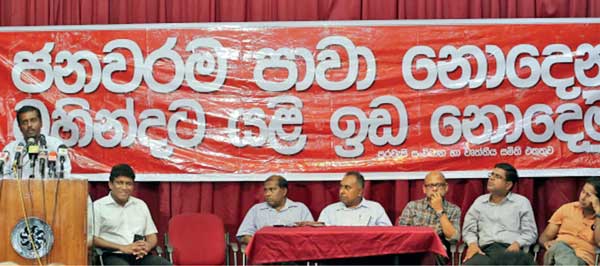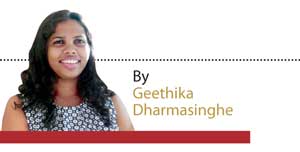Reply To:
Name - Reply Comment
Last Updated : 2024-04-25 00:00:00

 Recently we witnessed a prominent “civil society activist” expressing views in favour of the privatisation of education at a meeting organised by ‘Purawasi Balaya’ garnering displeasure from a large section of the audience.
Recently we witnessed a prominent “civil society activist” expressing views in favour of the privatisation of education at a meeting organised by ‘Purawasi Balaya’ garnering displeasure from a large section of the audience.
Who really are those in the Purawasi Balaya? After campaigning against the Rajapaksa regime, they continue to support the current government’s political, social and economic policies promoted especially by the ruling coterie who believe in neo-liberal fundamentalism. This stratum of Sri Lankan society represented by the “civil society” has emerged very recently and does not have much grounding with the social and economic history of the country. They do not fall under the category of “nobodies” who turned into “somebodies” during the colonial period that Dr. Kumari Jayawardena talks about in her famous treatise.
Most of these civil society activists who have emerged in the past two decades or so do not have links with the traditional bourgeoisie of Sri Lanka which sprang up accumulating wealth based on British colonialism. They have not climbed up the social ladder engaging in liquor renting, acquiring land or marrying into the upper castes. Unlike the traditional bourgeoisie, this “civil society” does not have a large surplus in wealth and they do not invest their capital socially with the view of building up their image. They do not build schools, temples and resting halls. In short, they are not the Silvas, Pieris’s, Jayawardenes or Wickramasinghes in the traditional sense. Inquiring into the emergence of this stratum becomes that much important for that very reason. For example, some such prominent activists have built up their social power and earnings not using traditional means, but through foreign aid and professional engagements within the country.
Most of them earn their money supporting the system through manipulating public opinion and audaciously defending the privatisation of education, health and transportation. This stratum is dangerous because they do not stop at earning money but goes on to ideologically influence the social and economic conditions central to the lives of the ordinary people.
Unfortunately, the social, economic and political desires of this “civil society” stratum, who have become unscrupulous mouthpieces of the rulers instead of the people, are different from the representatives of the previous social formations. Their predecessors did not stand with the privatisation of education and health. Therein lies the difference between this new civil society and the social class of 1956.
Without a proper study or understanding, these activists sing praise of outdated economic thinking. Globally, economic reforms based on the faith in markets have had catastrophic consequences. The American dream of the Americans whose daily life is controlled and directed by the market has incredulously failed. A tiny fraction of 1% of the Americans has become the consumers of those dreams reducing the rest of the 99% to mere assistants in building that dream. The “civil society” in Sri Lanka does not seem to even have a deeper understanding of the reasons that led to ‘Brexit’. The European Union was a prime example of the markets operating without hindrance. The free flow of labour and a borderless society were its conditions. However, the British people’s rejection of that concept has passed the attention of the local well wishers of the free market policies. They are not even paying attention to the economic structures of Scandinavian countries which have strong states.
However, cultural theorist Stuart Hall has once shown that the Left has only strengthened the state hiding behind welfare. Although this is not the space for that discussion it should be noted that the relationship between the state and capitalism are discussed through two approaches.
One is to have faith in state welfare, while objecting to capitalism. The other is to oppose both the state and capitalism. However, both approaches hold views critical of capitalism. Therefore, the horizon of thought of those who believe in a new world should be formed with this understanding not being apologists for the complete elimination of social welfare which have survived and were protected to at least some extent in the last phase of capitalism. Therefore, the politics of these ‘nobodies’ who support deregulation and privatisation, represent not the future well being of the society but a hedonism of short sighted consumption.
If you want to understand the importance of free education all you have to do is to look at a society arranged around the idea of private education. For example, American students cannot choose education. They are compelled to work while studying and they enter the university inheriting indebtedness. They have to raise loans to pay for education and spend the rest of their lives paying up those loans. Those who fail to do so will not be eligible to take any other financial assistance and therefore will have to give up the dream of a vehicle, a house or access to good healthcare. The economy is based on credit and your credit history will be delved into at each purchase. If you do not have credit, that is if you have not finished re-paying your loans, you will not have space in American society. Although functioning on a belief system of freedom Americans in reality are not free.
The question we must raise is why some groups in the “civil society” cannot demand an expansion of the state instead of privatisation. When there are examples around the world about success stories of strengthening the welfare state, when people of developed countries struggle for the welfare state why do these groups believe the welfare state has failed?
Development is not measured by your capacity to buy, but on the control you have over your leisure time, on your right for medical treatments free of charge in case you fall ill. To sum up, development is a social system that does not force you to sweat to fulfill the shameless dreams of another. This is the reality that some in the “civil society” should wake up to.
The writer is reading for her PhD in Asian Studies at Cornell University. She graduated from the University of Colombo with a BA special degree in Sociology. Thereafter being a Fulbright scholar she did her Master’s at Northern Arizona University. She was a full beneficiary of the Sri Lankan free education system.

Add comment
Comments will be edited (grammar, spelling and slang) and authorized at the discretion of Daily Mirror online. The website also has the right not to publish selected comments.
Reply To:
Name - Reply Comment
US authorities are currently reviewing the manifest of every cargo aboard MV
On March 26, a couple arriving from Thailand was arrested with 88 live animal
According to villagers from Naula-Moragolla out of 105 families 80 can afford
Is the situation in Sri Lanka so grim that locals harbour hope that they coul